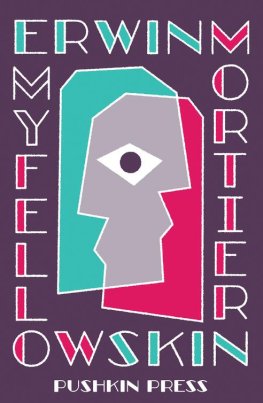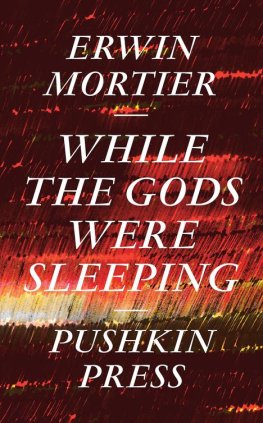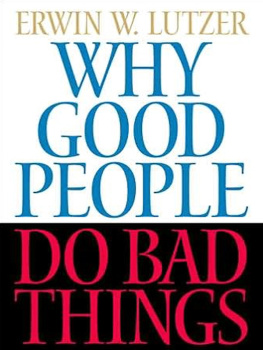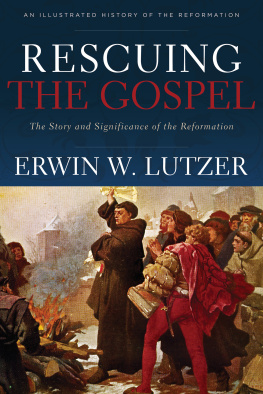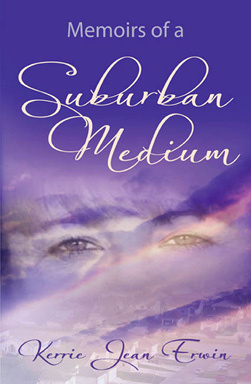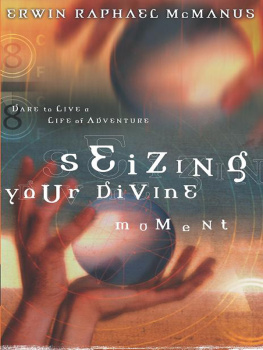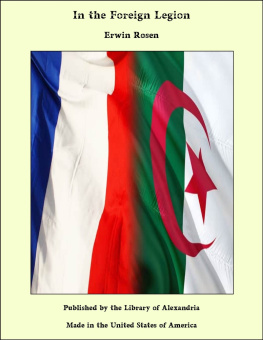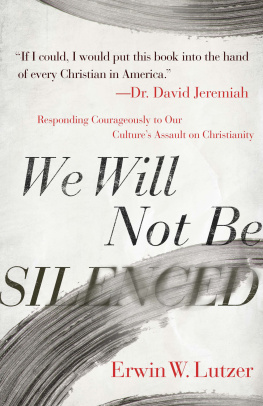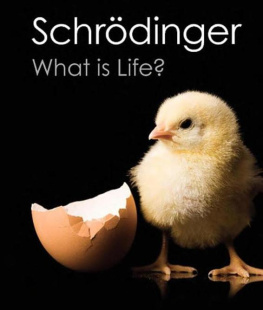Erwin Schroedinger - What is Life? The Physical Aspect of the Living Cell
Here you can read online Erwin Schroedinger - What is Life? The Physical Aspect of the Living Cell full text of the book (entire story) in english for free. Download pdf and epub, get meaning, cover and reviews about this ebook. genre: Romance novel. Description of the work, (preface) as well as reviews are available. Best literature library LitArk.com created for fans of good reading and offers a wide selection of genres:
Romance novel
Science fiction
Adventure
Detective
Science
History
Home and family
Prose
Art
Politics
Computer
Non-fiction
Religion
Business
Children
Humor
Choose a favorite category and find really read worthwhile books. Enjoy immersion in the world of imagination, feel the emotions of the characters or learn something new for yourself, make an fascinating discovery.

- Book:What is Life? The Physical Aspect of the Living Cell
- Author:
- Genre:
- Rating:5 / 5
- Favourites:Add to favourites
- Your mark:
- 100
- 1
- 2
- 3
- 4
- 5
What is Life? The Physical Aspect of the Living Cell: summary, description and annotation
We offer to read an annotation, description, summary or preface (depends on what the author of the book "What is Life? The Physical Aspect of the Living Cell" wrote himself). If you haven't found the necessary information about the book — write in the comments, we will try to find it.
What is Life? The Physical Aspect of the Living Cell — read online for free the complete book (whole text) full work
Below is the text of the book, divided by pages. System saving the place of the last page read, allows you to conveniently read the book "What is Life? The Physical Aspect of the Living Cell" online for free, without having to search again every time where you left off. Put a bookmark, and you can go to the page where you finished reading at any time.
Font size:
Interval:
Bookmark:
A scientist is supposed to have a complete and thorough knowledge, at first hand, of some subjects and, therefore, is usually expected not to write on any topic of which he is not a master. This is regarded as a matter of noblesse oblige. For the present purpose I beg to renounce the noblesse, if any, and to be freed of the ensuing obligation. My excuse is as follows:
We have inherited from our forefathers the keen longing for unified, all-embracing knowledge. The very name given to the highest institutions of learning reminds us, that from antiquity and throughout many centuries the universal aspect has been the only one to be given full credit. But the spread, both in width and depth, of the multifarious branches of knowledge during the last hundred odd years has confronted us with a queer dilemma. We feel clearly that we are only now beginning to acquire reliable material for welding together the sum total of all that is known into a whole; but, on the other hand, it has become next to impossible for a single mind fully to command more than a small specialized portion of it.
I can see no other escape from this dilemma (lest our true aim be lost for ever) than that some of us should venture to embark on a synthesis of facts and theories, albeit with second-hand and incomplete knowledge of some of them, and at the risk of making fools of ourselves.
So much for my apology.
The difficulties of language are not negligible. One's native speech is a closely fitting garment, and one never feels quite at ease when it is not immediately available and has to be replaced by another. My thanks are due to Dr Inkster (Trinity College, Dublin), to Dr Padraig Browne (St Patrick's College, Maynooth) and, last but not least, to Mr S. C. Roberts. They were put to great trouble to fit the new garment on me and to even greater trouble by my occasional reluctance to give up some 'original' fashion of my own. Should some of it have survived the mitigating tendency of my friends, it is to be put at my door, not at theirs.
The head-lines of the numerous sections were originally intended to be marginal summaries, and the text of every chapter should be read in continuo.
E.S.
DUBLIN
SEPTEMBER 1944
Homo liber nulla de re minus quam de morte cogitat; et ejus sapientia non mortis sed vitae meditatio est. SPINOZA'S Ethics, Pt iv, Prop. 67
(There is nothing over which a free man ponders less than death; his wisdom is, to meditate not on death but on life.)
The arrangements of the atoms in the most vital parts of an organism and the interplay of these arrangements differ in a fundamental way from all those arrangements of atoms which physicists and chemists have hitherto made the object of their experimental and theoretical research. Yet the difference which I have just termed fundamental is of such a kind that it might easily appear slight to anyone except a physicist who is thoroughly imbued with the knowledge that the laws of physics and chemistry are statistical throughout. For it is in relation to the statistical point of view that the structure of the vital parts of living organisms differs so entirely from that of any piece of matter that we physicists and chemists have ever handled physically in our laboratories or mentally at our writing desks. It is well-nigh unthinkable that the laws and regularities thus discovered should happen to apply immediately to the behaviour of systems which do not exhibit the structure on which those laws and regularities are based.
Font size:
Interval:
Bookmark:
Similar books «What is Life? The Physical Aspect of the Living Cell»
Look at similar books to What is Life? The Physical Aspect of the Living Cell. We have selected literature similar in name and meaning in the hope of providing readers with more options to find new, interesting, not yet read works.
Discussion, reviews of the book What is Life? The Physical Aspect of the Living Cell and just readers' own opinions. Leave your comments, write what you think about the work, its meaning or the main characters. Specify what exactly you liked and what you didn't like, and why you think so.

